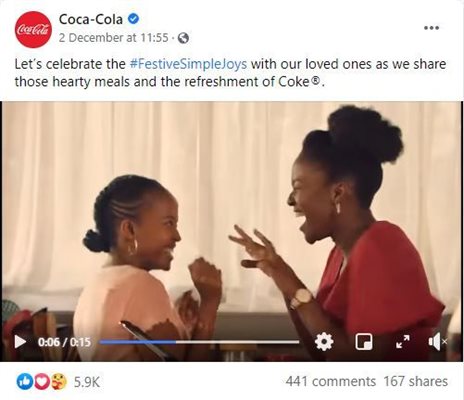As content creators, we'd all like to think that the content we produce is interesting enough to stand the test of time. Unfortunately for us, when it comes to Facebook, there are more than 30 billion pieces of content published on the platform each month that our posts have to compete with to make it into someone's newsfeed.

Photo by cottonbro© from
PexelsThe sheer volume of content being shared globally has meant that over the last couple of months especially we have seen a dramatic and steady decline in the reach that organic content receives. It would be nearly impossible for Facebook to offer up every piece of created content.
Due to this, Facebook tries their very best to show users the most relevant content available for them. As a Facebook user, you could spend less than 20 minutes looking at content online and within those 20 minutes, depending on how you’ve engaged with posts/pages or the videos you have watched, Facebook will start offering more of that type of content to your feeds.
You can actively watch this happen in the Facebook video stream. If you click on a video and start watching it, and then watch another video of the same type or from the same source straight afterwards, Facebook picks up that you like that type of content and will actively start throwing (quite relentlessly I might add) that type of content at you. You could (if you were paying attention) see the type of videos in that feed change based on how you interact.
The problem with this, of course, is that yes while this is fantastic news if you’re creating the type of content that the user is interested in and engaging with, if they don’t interact with the type of content that you’re creating then they’re not going to be served with your content.
It may seem then that if Facebook isn’t going to show our content to its users, what is the point of even creating it? There is hope though. Back in the Dark Ages (you know, roughly 1-2 years ago) we used to try and post as much content as was humanly possible. We would run page like campaigns to increase our audience, which meant that our content plan of posting a bazillion times per day was going to help us smash those KPIs out of the park (hello bonus - am I right?) and we could almost just recycle content to get that reach.
Facebook’s algorithm is a beast and to truly understand it would mean that you probably helped develop it (which I didn’t or I wouldn’t be writing this article). That being said, there are a few things that we know.
- Inventory - What’s on the menu? (What content has been posted by your friends and publishers) This is taking stock of what content is actively available (the more than 30 billion pieces of content each month)
- Signals - Breakfast, lunch or dinner? (Who is posting this content and has the user ordered it before?)
- Predictions - Would you like the Eggs Benedict? (How likely are you as a user to engage with this content?)
- Score - Here is your order, “but I didn’t order that” (what is the relevance score of this content concerning the user?) - This determines which publisher’s content you will be shown. By clicking that like button a week ago at lunchtime, you’ve told Facebook that when you’re online at that time that you want to see that content - enjoy those cute cat videos.
This list goes on and on, but this provides a good indication as to what Facebook's goal is with their algorithm. They are user-focused and they are trying to (as are most platforms) provide the best experience possible for their users - after all their users are their most valuable product. This means that they have prioritised high-quality and engaging content above overly promotional content, while user-generated content takes the top spot in the race for dominance.
And if you think that your brand is safe because you have a few thousand followers and your followers all love you, well let’s have a look at what a global brand like Coca-Cola is doing.
Coke’s Facebook page has more than one million followers and while, yes their page will be diced up and split between the regions, it is a safe assumption that their South African follower base is in the high millions. Their engagement, however...is not.
Coca-Cola, a brand that sells happiness (in the form of sugar in a can) doesn’t get the type of reach you’d ever hope for from a brand with that many followers. Coke is our best indication of how the times have changed. We need to adapt our content strategies to start including more paid promotions and higher quality content; we need to be less worried about how much we’re posting and more concerned with what we’re posting.
I did mention that all hope was not lost though, because Facebook has cultivated their product so well (their users) that we can purchase some space on their news feeds to drive our reach. Boosting of what would typically be organic posts is not a new feature to the platform, it's been around for years, but its relevance has never been more significant than where we are right now. Page likes are nothing more than a vanity figure which holds no value in making predictions about the type of reach or engagement your posts will receive in the next quarter.
Key takeaways
1. Know your audience
Facebook’s audience, at its core, is built around interest, not intent. You don’t need to start boosting and promoting every post that you upload. Stick to the good old 80/20 rule as a guideline. Facebook is a social platform so 80% of what you’re posting about should in some way be social. Use Facebook as the platform in which to build a community and find a way that you’re able to add value to your audience and customers.
Mix things up with: Brand story posts, personal posts, authority-building posts and lead-nurturing posts.
2. Don’t be “spammy”
It feels silly to have to say this, but don’t try and cheat the system by buying followers. Would-be influencers started doing this a couple of years back and it’s so transparent to the educated user. This brings me to the next point which is to be authentic - don’t use clickbait headlines to try and drive traffic to your site and for the love of all things holy please don’t spam your audience with 10 poor-quality and irrelevant posts every hour.
Stick to the platform guidelines and don’t waste money on things that are only going to hurt your business in the long-run. Your users might be able to fake it until they make it but your business can't.
. 3. AI is great, but it’s not everything
I’m usually the first person in the room to suggest building a chatbot. I love them and will continue to promote them to my clients (but they need to be developed properly - please don’t try building your bot on a free platform...it won’t work) but Facebook is a social platform and there needs to be an element of humanity to it.
While scheduling all your posts in line with the content plan for the next four months seems like a great plan because it frees up some time to do other work, we shouldn’t disregard the power of snapping a team selfie or showing the employees at the office. Embrace your humanity, don’t hide from it.
Social media is where we can be creative, informative and funny to give our audience something to smile about.
4. It’s not about the size, it's how you use it
This reiterates my point about why page likes are a waste of money. They negatively impact your performance as well. The larger your fan base or following on Facebook, the harder it is to create content for all the different segments in your audience. If you’re going to build a community, you need it to be tight-knit and super hyped!
Facebook actively penalises pages with massive followings purely because it’s impossible to show relevant content to all those users (as we saw with the Coke example).





















































